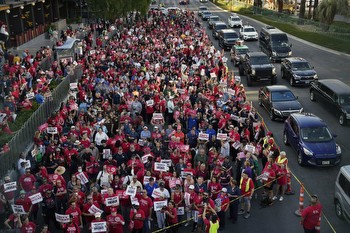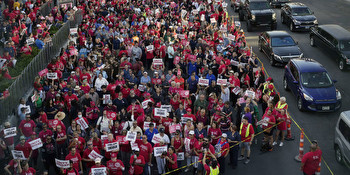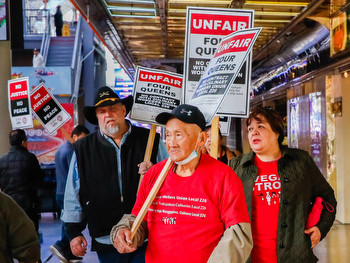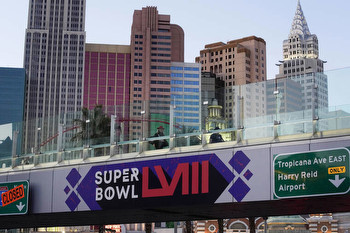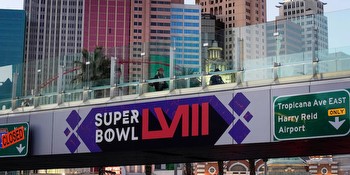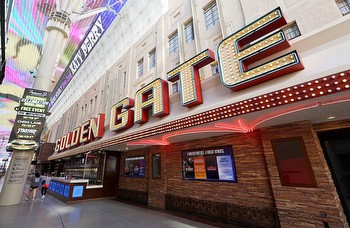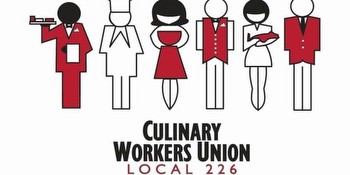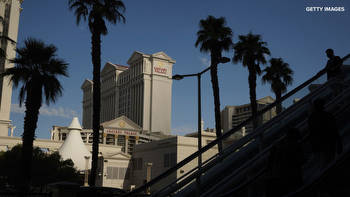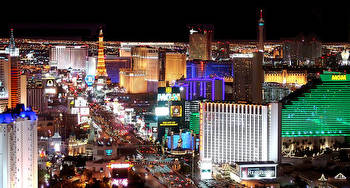Culinary negotiations with three casino companies were predictable
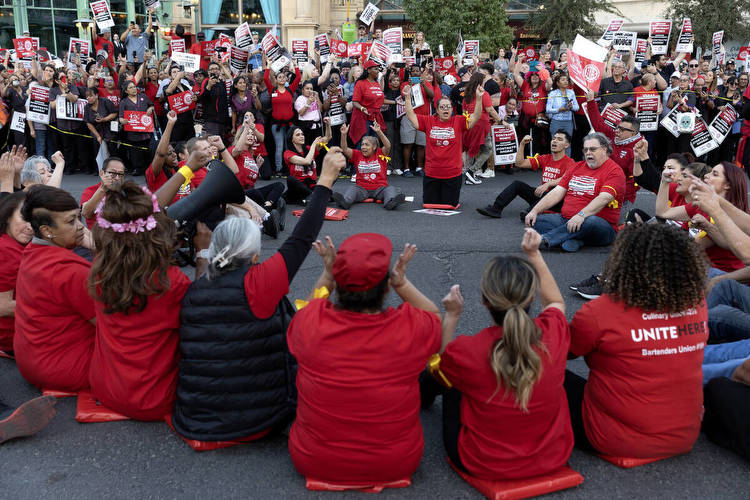
Following the Culinary union’s negotiation process with three major casino companies was like watching the movie “Titanic.”
Once the union struck its deal with Caesars Entertainment Inc. on Nov. 7, everybody who has ever seen the union in action knew other companies would fall in line, just as surely as everybody who has seen the 1997 James Cameron epic knows the massive ocean liner will hit an iceberg and sink.
But everybody was seemingly glued to their seats to watch exactly how it was going to play out.
A Strip executive told me the word “orchestrated” came to mind when describing how the final hours before a strike deadline arrived.
Riveting drama
But you have to hand it to Culinary: It’s really good at choreographing and producing drama and keeping an audience riveted until the end.
Each tentative approval of the richest contracts ever reached came after several hours of negotiations, followed by an often-delayed early media briefing saying they were close to agreeing to terms, followed by an early-morning announcement on X that a tentative deal was done.
Caesars agreed first, then MGM Resorts International the next day, followed by Wynn Resorts Ltd. on Nov. 9. The announcement of the tentative deal with Wynn came hours before 35,000 workers between the three companies were destined to walk off the job.
Right on cue, hours after the Wynn deal was done, President Joe Biden sent a congratulatory message to the union saluting the work it had done to head off certain calamity if a deal wasn’t reached.
Some may still be on the edge of their seats wondering if the workers will ratify the tentative agreements that are scheduled to go to a vote later this week. They’re just like the moviegoers that wondered whether Jack and Rose would make it once the Titanic sank.
In the end, most people have to be happy for the thousands of Culinary workers who are on the verge of getting a new deal and give credit to union leaders who were able to use the pending Formula One Las Vegas Grand Prix as leverage in forcing the deals to get done.
For weeks, Culinary controlled the narrative, organizing attention-getting informational demonstrations, calling for and successfully conducting a strike deadline vote and calling the media to capture images of union members building the signs they would carry if they went on strike the morning of Nov. 10. One wonders now how much it cost to build all those signs and where they all went. Hopefully, at least one of those signs was kept so that it could be displayed in a museum some day.
Culinary media appearances had the same formulaic approach: Secretary-Treasurer Ted Pappageorge would give a rundown on what was new, union workers from different companies would give their own personal testimonies about why a contract was needed with at least one of the workers addressing reporters in Spanish.
The floor would then be open to media questions, most of which couldn’t be answered because they sought too much inside information about details of the contract.
Higher pay
The new deal amounts to workers going home with an extra 11 percent in their pockets the first year and 33 percent by the end of the fifth year. Some who said they had to work two jobs in order to make ends meet can quit their second jobs if they want. Some of them probably won’t.
Workers are assured they’ll be compensated if technological advancements ever lead to them being laid off.
Workers presumably will be safer in the workplace with contracts with terms for systems to alert someone if workers are ever endangered on the job. Some companies had already provided “panic button” technology for their housekeeping workers.
Contracts also require housekeepers to clean rooms daily, even if a guest doesn’t want it. Again, some resorts already had that in place, so there was no change for them. Even though to some it seems like a potential waste of resources — it takes extra water to clean thousands of rooms — the resorts can simply tell a guest to deal with an unwanted cleaning because it’s in a union contract.
Coincidentally, MGM and Wynn had earnings conference calls with investors on the same days as their final contract negotiations. While Wynn executives chose not to talk about the status of their talks during its call, MGM answered some questions.
MGM executives disclosed that they knew they’d be paying more in labor costs since the summer when existing contracts expired. So they accrued money to prepare for that added expense – which makes some wonder why the whole contract negotiation process didn’t happen a lot earlier instead of waiting until hours before the start of Formula One week.
But for the Strip’s big companies, the process appears to be over and Culinary will focus on securing deals with other Las Vegas companies such as Hard Rock International’s Mirage, Phil Ruffin’s Treasure Island and Circus Circus, Virgin Hotels Las Vegas and all the downtown Las Vegas properties. Culinary already has a deal in place with Fontainebleau, which opens its doors in December.
The last time contract negotiations occurred, all the other properties fell into place like dominos after the big boys settled.
Now that the biggest deals are done — or at least mostly done — life can go back to normal and Culinary can get back to harassing Station Casinos with which the union has been battling for years.
It’s as easy to predict as the outcome of “Titanic.”









